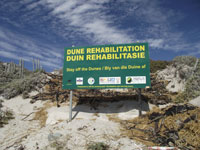A promising economic future lies ahead for the Saldanha Bay area, but pressure from local communities and increasingly stringent regulations will compel any developer to tread carefully through this environmentally sensitive zone.
This picturesque part of the West Coast has a number of unique environmental features that attract and shape business development in this area. Saldanha Bay is the only naturally deep and sheltered port along this stretch of the coastline, which led to the construction of the iron ore port in the 1970s and, with it, a steady increase in residents and the establishment of associated businesses and industries.
To the south of Saldanha lies Langebaan Lagoon, a Ramsar-listed wetland of international significance, which is the last stop for thousands of birds migrating south each year from the European autumn.
Critical biodiversity areas
Many parts of the lowland and coastal areas around Saldanha Bay are now designated as critical biodiversity areas (CBAs) by the province's statutory conservation body CapeNature. There is also growing legal protection of the county's coastline through the Integrated Coastal Management Act as well as the EIA Regulations. Environmental impact assessments are, thus, frequently required in this area before any decisions can be made about development.
The local community is very aware of the area's environmental attributes and the risks posed by uncontrolled development; many sectors, such as tourism and aquaculture, rely on a clean environment. Community groups are, therefore, very active in the environmental consultation processes that are triggered by new project proposals and are vigilant of the activities of businesses already operating in the area.
However, as in most parts of South Africa, there is also the need for growth and job creation; so alongside the environmental lobbies and codes that make investors more accountable for their impact on nature, other local groups exert pressure to bring employment to the area.
Communities seeking jobs
We have noted that communities seeking jobs are increasingly vocal in support of projects that could create employment.
This high level of stakeholder engagement is a feature of this town. Having been involved there for well over a decade, SRK has conducted various environmental, social and economic studies, developing a keen sense of the issues, role players and technical and legislative peculiarities in the area.
We've also managed many permitting processes for clients, to ensure environmental compliance and best practice once a project has received environmental authorisation.
A number of new laws have come into effect in recent years that have changed requirements for permitting. Previously, any effluent discharged into the coastal environment fell under the National Water Act and required a water use licence. But this law doesn't really consider the marine environment, so the Integrated Coastal Management Act is a step forward in this regard, introducing the need for coastal water discharge permits. SRK is helping a number of clients to navigate this permitting process.
Clients have also been assisted to obtain atmospheric emissions licences in terms of the relatively new Air Quality Act, as well as waste management licences in terms of the 2008 Waste Act. Recent coastal projects requiring this assistance include port expansions, a fishmeal plant, a desalination plant and minerals beneficiation facilities.
It is vital that we keep abreast of the relevant requirements for EIAs and other permits, as well as general trends in the area. Regular interaction with district and municipal permitting authorities is also paramount.
Insights into the main issues
Experience in environmental and social impact assessment in Saldanha has enabled projects to move forward quickly, through unique insights into the main issues and effective stakeholder engagement.
Broad exposure to the area has also assisted in compiling strategic planning documents, such as the West Coast District Municipality's Coastal Management Plan. This document identifies key priorities for coastal management in the area and assigns responsibilities to various government authorities.
As the northernmost deep-water port on the West Coast, it is anticipated that Saldanha Bay can become a key service hub providing maintenance and other services for the Angolan oil and gas sector. Proposals to establish an industrial development zone at Saldanha Bay emphasise the potential value of logistics, repairs, maintenance and fabrication work for companies on the oil and gas fields of sub-Saharan Africa.
Due to our extensive involvement in oil and gas projects in Angola, Mozambique and South Africa, we hope to play an active role in the environmental management of future oil and gas activities in Saldanha. Intense local interest will ensure that these opportunities are closely scrutinised.




































